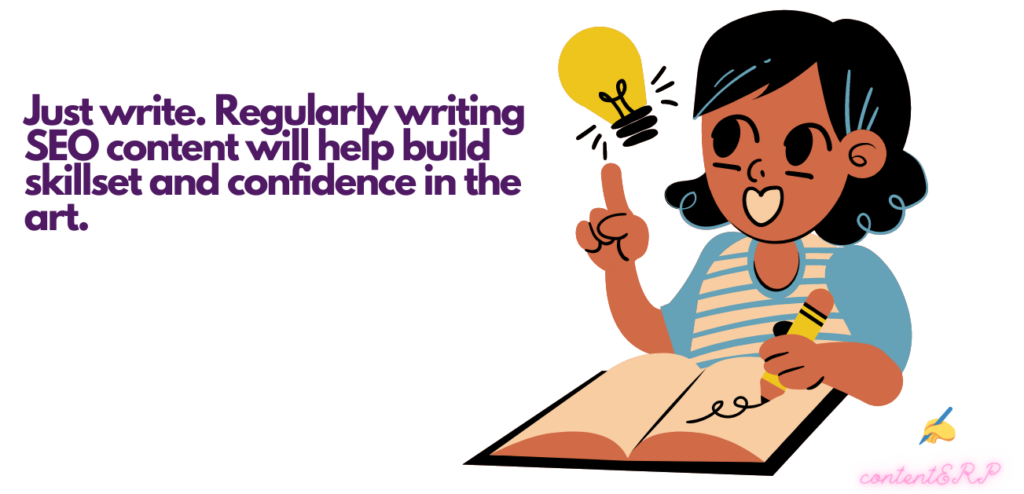How to improve content writing skills
As an SEO content creator, it is your duty to seek out ways how to improve content writing skills constantly. Creating quality and effective SEO content is essential for any business wanting to rank higher on search engine results pages. However, writing content that looks good, packs a punch with the right keywords, and is also easily readable and interesting for the average person can be daunting.
This article will give tips on improving your SEO writing skills and producing content that ranks high and engages your audience.

What Is SEO Content?
Writing an SEO article requires a precise mindset, whereas writing standard content requires link-building to be done correctly, and care should be taken to cast each link positively.
Keywords like “SEO writing” give a false impression of content creation. Since there is a significant difference between writing content and writing it in SEO, the term SEO writing can be misleading. Writing an SEO article is entirely different from writing a conventional one.
The process of using SEO strategies and approaches entails writing content well optimized for both search engines and your target audience. Regular content writing entails content for people. You can get help writing content for people by visiting a website that serves as a content writing service, such as Writing Judge.
What Is SEO Content Used For?
SEO is used to make the output of your site correspond to the specified set of search queries. It gives people more chances to view your site and ensures they know which place it should be in search results.
Learn the basics of SEO
Rather than guiding new SEO writers through a massive manual or series of articles, we will focus on the most important basics here. This way, you can fine-tune strategies, tactics, and skills that are important to you rather than becoming overwhelmed and turning away.
Base content writing on search intent
Search is the process of looking for things either informally or formally. It often refers to means and access of information, or contents, which is usually found on the World Wide Web. Search is not fancy; it is just if a user searches for something.
Because people’s queries reflect where they are in the conversion funnel, understanding search intent can help you create and improve your content writing skills to better target potential customers.

A thorough understanding of search intent can help you:
- You should search for keywords that people often use when looking for concrete things.
- Focus your content on answering user questions and structuring pages in a friendly way for search engines and users.
- Rank higher by creating valuable content to search engines and relevant to their users.
There are four main types of search intent:
- Informational. Searcher seeks to know more about a certain topic. This article is an example of informational intent.
- Navigational. Searcher already knows what they are looking for and trying to navigate the page. “SEO writing, contenterp.com” is a good example of this search query.
- Transactional intent. A searcher in this stage is sure of what they want and is ready to complete a purchase. e.g., “buy Fent beauty foundation.”
- Commercial intent. Users need more comparative information on a product they are interested in. For example, “Fenty beauty vs. mac foundation prices.”
Use an optimal article structure.
With your content, it is important that Google gets it because they rely heavily on a featured snippet on SERPs to rank high in the search results. The featured snippet displays something related to the keyword in the snippet and how relevant the result is to the keyword.
You need to show that there is value in reading your content, so let’s talk for a second about content detection. The hallmark of a well-written article is, without a doubt, relevance.
This means that the topic you write about accurately and measurably relates to the keywords you optimize for. Online publishers may use something called content detection to help ensure that their articles include most keywords as intended. On the back of quality content, the rankings skyrocket in the
Trustworthiness, writing quality, and how well an outlet covers keywords are some of the many factors that Google considers when determining one company’s featured snippet placement above another. Those factors are in line with the following set of publishing methods.
Article structure & layout guidelines
Headings
H1 for your title, H2 for main headings, and H3 for subheadings. Use headings to break up your content into consumable pieces for your readers. Readers should be able to scan it quickly to find the information they’re looking for.
Google scans your headings before the rest of the content to decide what’s important on your page, so use them wisely. –
Paragraphs
In general, you want to keep your paragraphs short. They should be little bites of information, easier to chew and swallow than long paragraphs with a ton of information or ideas.
Of course, not every piece of content was meant to have short paragraphs. You might use longer paragraphs if you’re going in-depth or explaining something complicated. In general, though, keep them bite-sized.

Write a compelling, descriptive, and optimized title and meta description.
Do you know what it takes to rank the landing page in the SERPs? All your SEO research doesn’t matter until you know what the content searchers are looking for. What words and phrases are your competitors using? What content is going to show in the top spots?
The first title you come up with will be very much stripped down. Some frameworks outline “best practices” for a title – i.e., “10 Simple Tips to Get Your First Article Published” – but that doesn’t mean that you need to write something simplistic. Try to optimize it so people can know what the piece’s content will actually be.
You could use the services of an article ghostwriter, app developer, or something similar. To improve content appearance on SERPs, focus on the following key strategies:
- Title length: It will show your title from 50 to 60 characters.
- Tag length: Your meta description should be limited to 155 characters or fewer. This is why Yoast makes it easy to figure out your meta description length with a tool like Portent.
- Use a Content preview tool to better understand how your title and description look to visitors. Try this one from Portent or this one from Toolbase.io SERPsim.
Conduct sufficient research on SERPs.
For SEO, it is prudent to perform some SERP research. That is especially so when preparing an article or looking to write a piece because there may be a lot of what people are doing online, and SERP research provides both insights about what other publishers are already doing and the inherent potential you may have.
Sharpen your keyword knowledge and usage skills.
To effectively produce content for SEO, keyword research is among the most important. However, the method for putting keywords in the content’s activity does not matter, but rather how it comes out for the purpose of SEO.
Google scans a webpage to determine if your content is something the search engine users are looking for based on plain text patterns, not keywords or meta-descriptions.
What you write might be shared on a social platform. Think about the context. People are adding more context to their shareable media (video and posts) and through links. A competitor sharing your story through the body text on a website, brochure, blog, or newsletter has a lot less context than a LinkedIn newsfeed
Keyword and topic research and usage basics
Research both topics and keywords. Taking your idea and researching both topics (what’s already out there, what’s missing, what related topics are) and keywords (a tool like Uber suggest) will help you focus most clearly. You should be laser-focused on only one topic idea.
A topic with a lot of input, though, makes for many great ideas across various articles. Keep a list of these in a diversion. – Analogue / Topic you want to write about. Most of the top content that ranks highly on Google is focused on one main idea.
- Your title and page headings MUST include your keyword, but…
- Do NOT overuse keywords. Too many keywords can hurt you. Your use of keywords should be natural and not like spammers originally inserted jargon in their marketing e-mails.
Update Your Content Regularly
Fresh content improves your site’s relevancy. You can achieve this relevancy by ensuring your content is updated on a schedule. Be sure to review it on a set schedule.
Know How to Find Keywords
When writing, you need to choose the right keywords. You must know popular keywords, where they rank, and how many competitors are listed there. After ranking, pick the best keywords for your content. An SEO copywriter must analyze the search volume and pick the most suitable keywords.
Link Wisely
You should use internal and external links to support the SEO content on Wikipedia. Internal links prevent users from getting irrelevant information. Broken links are dangerous and can lead to your site being disapproved or penalized.
If your page is framed and internal links are working, Google can see that your post is exceptional. You can also network and establish links with others in your industry and other external sources.
You are encouraged to include links that help your business mates to convert your visitors to leads for your product or service. For instance, you may want to include links to one of our product pages for our program reports.

Write Long Content
Search engines have shot several algorithmic updates that reward longer, more informative content and penalize thin content. A good rule of thumb is if you’ve got more than 1,000 words of content, you need each web page to be at least 1,050 words long.
Longer content can be used for various purposes, such as lists, tables, bullet points, and interspersed text. When it comes to the content itself, try to provide more complex information and vary the methods used to dive through it. For people, this simpler information will be easier to absorb.
Leverage SEO Resources
Entertainment marketing is the logical step in addition to content marketing after the strategic analysis. I believe most content marketers should put some time into SEO copywriting at some point during their careers because the crossover is so clear.
I love to dig into articles that focus on the intersection of SEO and content. Too many times, content marketers try to do everything, which usually leads to an ineffective campaign.
Conclusion
Start by exploring common queries that confirm your desire to create content that helps users and does not annoy them. Since you’re a novice writer, at least for eLearning content, it’s a good idea to devise a call to action or a key phrase that will permit people to discover easy resources on your company website. We’ve got the expertise, content know-how, and a good conceptual sample of SEOs to help you choose and plan eLearning topics and turn them into content that actually answers users’ questions.

